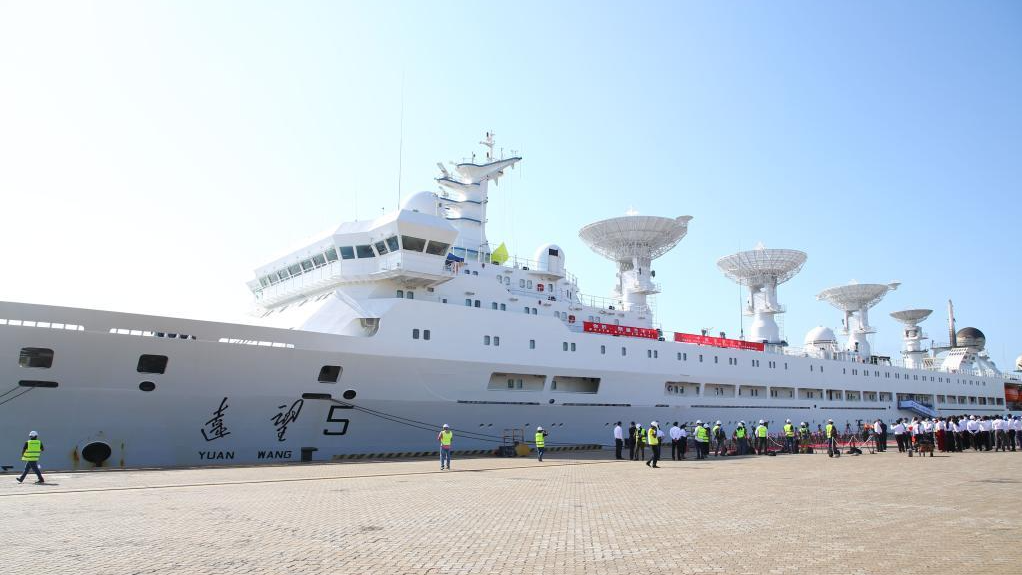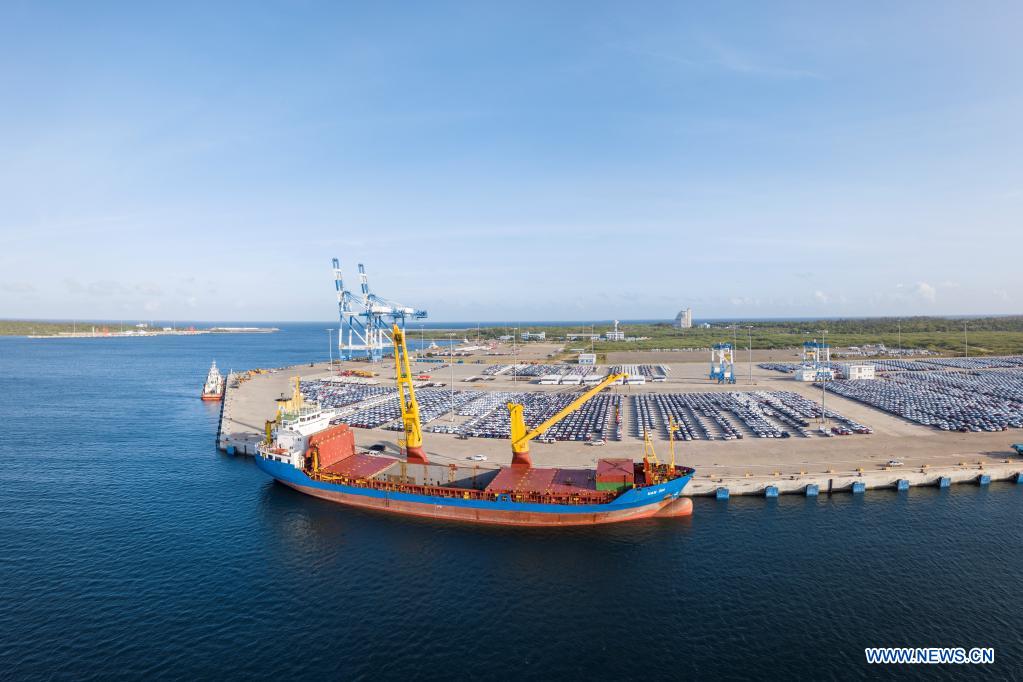
China's space-tracking ship Yuanwang-5 dock at Hambantota International Port in Hambantota, Sri Lanka, August 16, 2022. [Photo/Xinhua]
By Rabi Sankar Bosu
This week, Sri Lanka has once again made headlines in various news media outlets. The way the United States and Indian media outlets are criticizing the foreign policy of the current Sri Lankan government, as well as the Chinese government over the arrival of a Chinese ship in Sri Lanka is baseless.
China's space-tracking ship Yuanwang-5 anchored at Sri Lanka's Hambantota International Port (HIP) for replenishment purposes on August 16. According to media reports, it departed from the Chinese-run port on August 22 after refueling and other supplies.
Nonetheless, long before the arrival of the Yuanwang-5 in Sri Lanka's southern port of Hambantota, Washington and New Delhi expressed strong objections to Colombo from allowing the Chinese space-tracking vessel to land at its port without offering any "concrete reasons" for their opposition to it. The U.S. and Indian defense analysts have described the latest generation of the space-tracking ship as China's "spy ship," operated by the People's Liberation Army's Strategic Support Force (SSF).
The arrival of the Chinese ship took on an entirely different diplomatic dimension when U.S. Ambassador to Sri Lanka Julie Chung met Sri Lankan President Wickremesinghe and raised her country's concerns. Accordingly, there is little doubt that China's influence in the Indian Ocean has long been a geopolitical headache for the "security bloc" of the United States, Japan, Australia, and India.
On the other hand, New Delhi fears that Yuanwang-5 might get involved in tracking its satellite, rocket and intercontinental ballistic missile launches, citing the space-tracking vessel's "military capabilities." Both Washington and New Delhi's so-called apprehensions have unmasked their latent attempts to fend off China's rise in the Indo-Pacific region in order to wage a new Cold War through the so-called Indo-Pacific strategy.
In response, Beijing reaffirms that the Yuanwang-5 ship is serving a maritime monitoring mission in the Pacific Ocean and its arrival at the Sri Lankan port demonstrates the healthy and stable development of bilateral relations between China and Sri Lanka, while Indian media outlets are arguing that India's security is under threat due to this surveillance ship with several advanced technologies including sensors, which could "track India's ballistic missiles" from the Hambantota Port.
Indian media analysts should keep in mind that Colombo earlier allowed ships from India, the U.S. and other countries to its ports in compliance with international obligations. Yet China never pressures Colombo to refuse docking of other countries' ships at its ports by using its financial aid to the debt-ridden island nation, which New Delhi does.

A cargo ship at Sri Lanka's Hambantota International Port, June 30, 2021. [Photo/Xinhua]
The docking of China's latest-generation space-tracking ship may make India feel that it is in an intense competition with Beijing to establish the two countries' influence in the strategically important country. The welcoming ceremony of the Yuanwang-5 clearly signals that China has friendly ties with Colombo, despite the constant noise from a few other countries.
So the question is not the landing of the Chinese ship; the main question is New Delhi is really worried about the rise of Chinese influence in Sri Lanka. Many Indian commentators believe that the arrival of the Chinese ship has upset the Indian Prime Minister Narendra Modi-led government. The Modi government has helped Sri Lanka during the time of its worst economic crisis providing nearly $4 billion of support through multiple lines of credit for purchasing food, medicines and other essential commodities.
New Delhi remains wary of Chinese investments under the "Belt and Road Initiative" in Sri Lanka. On July 29, 2017, Colombo leased the Chinese-built Hambantota port to China for 99 years. India accused China of developing the Hambantota port into a naval base and criticized the project as China's "debt-trap diplomacy." Nonetheless, New Delhi's concerns over the Chinese-built port are unnecessary since China holds no military ambitions in Hambantota.
Chinese Foreign Ministry spokesperson Wang Wenbin said on August 16 that "the marine scientific research activities of the Yuanwang-5 ship are consistent with international law and international customary practice. They do not affect the security and economic interests of any country and should not be obstructed by any third party."
So it's unjustified for certain countries to cite so-called security concerns to pressure Sri Lanka, Wang said at an earlier press conference.
Accordingly, Beijing has no intention to offend New Delhi. If India continues to have problems with China-funded infrastructure projects and industrialization process under the Belt and Road Initiative in the island nation, it only shows New Delhi seeks to meddle in Sri Lanka's internal and external affairs. It is hoped that Indian media should not hype up China's normal activities in the Indian Ocean with prejudiced thinking or stirring up China-Sri Lanka bilateral relations. Hence, India should learn to accept China's presence in the region and to work with Beijing for its own interests.
Rabi Sankar Bosu is an Indian contributor to Chinese media outlets. He writes about Chinese politics, social and cultural issues, and China-India relations with a special interest in the Belt and Road Initiative.

 中文
中文



